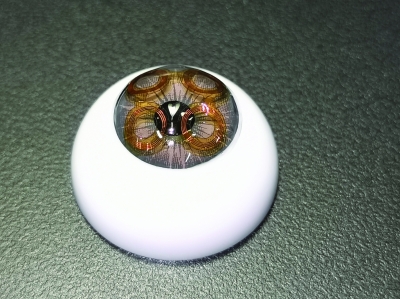Wearing Contact Lenses to Control Objects

Contact lenses with eye tracking function. (PHOTO: Nanjing University)
By Staff Reporters
After putting on your contact lenses you now only need to move your eyes to control smart devices such as mobile phones to input text, draw, play games, and perform other touchless actions.
This innovation is down to work by a research team from Nanjing University, Nanjing University of Aeronautics and Astronautics, and Jiangsu Province Hospital, who recently developed a kind of contact lens with eye-tracking capabilities. This contact lens has broad application prospects, including rehabilitation assistance for the disabled, medical diagnosis and treatment, and psychological research.
The smart contact lens is similar to the commonly used contact lenses on the market in terms of material, both using medical-grade silicone rubber material with a thickness of approximately 100 micrometers. Its uniqueness lies in the four evenly distributed golden coils on the lens. These coils are radio frequency (RF) chips which are the core of eye movement perception.
The innovation of this smart contact lens lies in its ability to track eyeball movement trajectories and recognize eye movement commands with high precision through the built-in RF chip.
Meanwhile, it works collaboratively with a set of wireless RF devices,which are similar to card readers on buses and can send RF signals to the RF chip. When the eyeball moves, the frequency and intensity of the signal reflected back by the RF chip will change. By analyzing these signal data, the movement trajectory of the eyeball can be accurately tracked.






